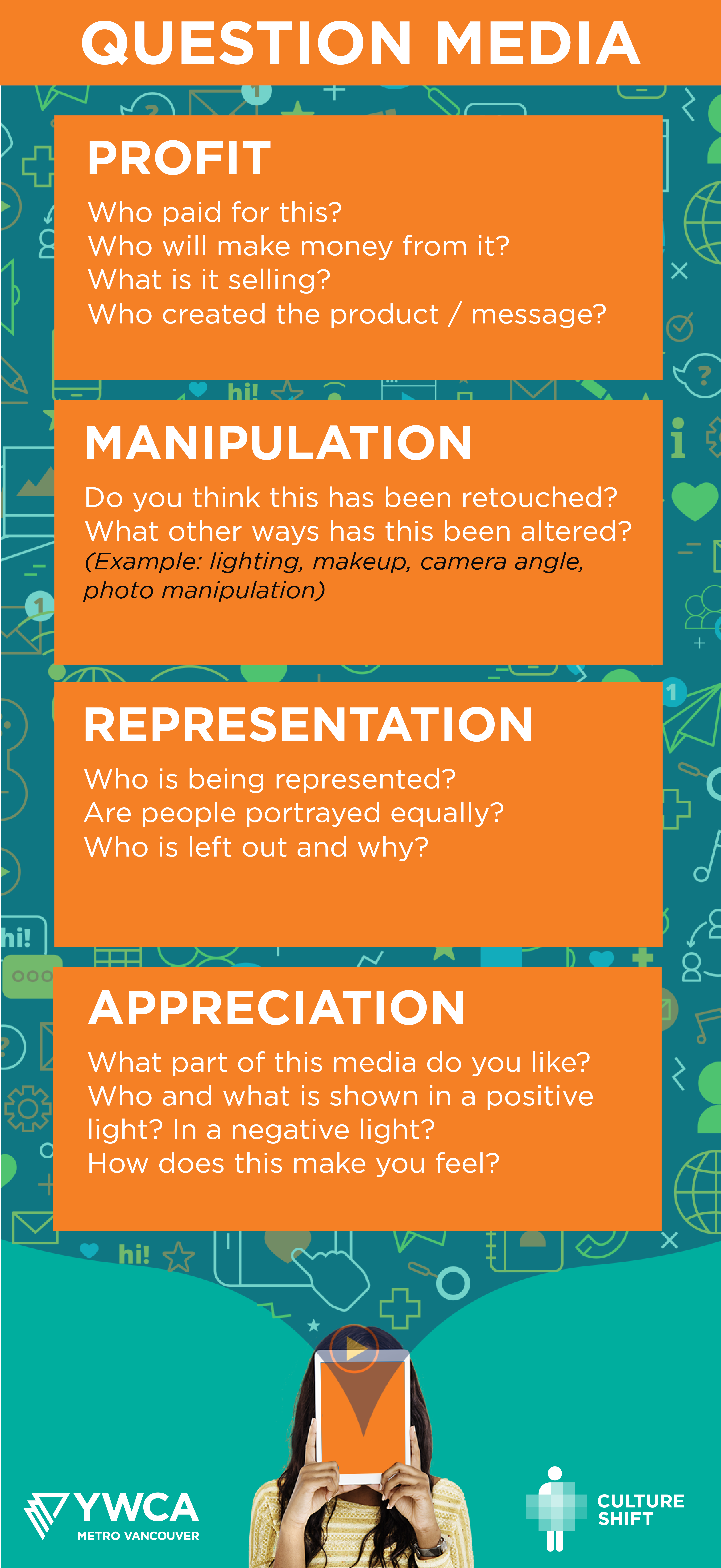
On average, Canadian kids are watching 6.5 hours of screen time a day. During that time, they are exposed to an onslaught of sexualized content, from pop music to consumer ads, to social media and porn. We will never be able to remove this kind of content completely from the lives of children, but we can teach them to engage with the hypersexualized world with a critical eye. How do we teach kids to critically engage with media? Through media literacy.
Media literacy it is the ability to access, analyze, evaluate and create media in a variety of forms. It is the ability to critically understand the nature, techniques and impacts of media messages and productions. At its simplest, media literacy means considering all the possible meanings in front of you – not just the obvious ones. Media literacy allows us to break through the noise, to understand what and how we are being sold, and to be less vulnerable to the psychological impacts of potentially harmful images.
The first step in media literacy is understanding some of the post-production techniques that marketers employ to sell us a more “perfect” product. Images are regularly, if not always, enhanced to make models appear slimmer, whiter, younger and smoother. One of my favourite tools for introducing these practices is the Dove Campaign for real beauty video, Evolution. It really hits home how the images of people we so often see hardly resemble that person in real life. Primarily used to retouch ads of women, post-production edits to men’s images are becoming increasingly common as well. And, while Photoshop used to be a post-production tool reserved for professional photographers and marketers, it’s now a readily available technology used by anyone. Apps like Facetune let anyone with a smartphone digitally enhance, edit and retouch their images for a “more perfect” selfie. Consider that the next time you scroll through Instagram!
The second concept that can increase media literacy is to always think about the commercial implications of an image. Asking questions like what product is being sold here? and who owns this company? can lead you up a ladder of corporate power, gender inequality and contradiction. For example, did you know that both Dove and Axe Body Spray are owned by the same parent company, Unilever? The messages brought to us by self-proclaimed body-positive Dove are intimately related to the ultra sexist and sexualized ads of Axe. Thinking critically about who and what is being sold to us, especially in this day of covert Instagram ads and targeted marketing, will make us less susceptible to the impacts of sexualization.
The third piece of media literacy that we can cultivate in young people is the creation of their own media. Did you know that there are only six media giants who distribute close to 90% of America’s media? This means that six massive corporations are responsible for 90% of the information we consume on a daily basis. And, just like I suggested above – if you are to trace the corporate ladder up you will find that the corporate and executive leadership of these conglomerates are primarily male. By encouraging young people to create their own media through storytelling, pictures and video, we will be giving them tools to disrupt the corporate media environment.
These three tips (understanding digital post-production, questioning the consumer nature of the image, and considering media conglomeration) will help you to be a little more critical of just what you watch, buy and share.
The issue of sexualization of girls and women permeates all levels of society and is a major impediment to achieving gender equality. This is problematic because it places physical attractiveness and sexuality as women’s most important qualities at the cost of other characteristics like intelligence or social impact. Here at the YWCA Metro Vancouver, we are taking various steps to tackle the issue of sexualization. Teaching media literacy and critical thinking continues to be one of our most powerful grassroots tools.

Click here for a full list of resources to question media.
Want to learn more about how you can join YWCA Metro Vancouver in combatting sexualization? Check out our Culture Shift project.

